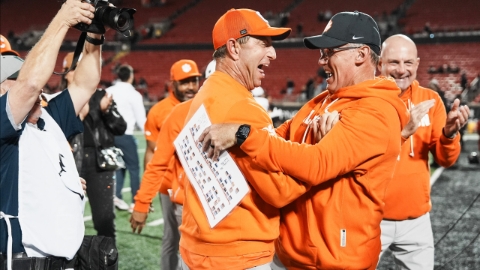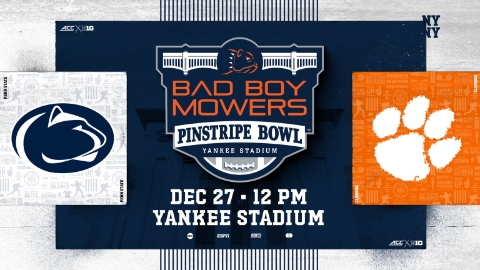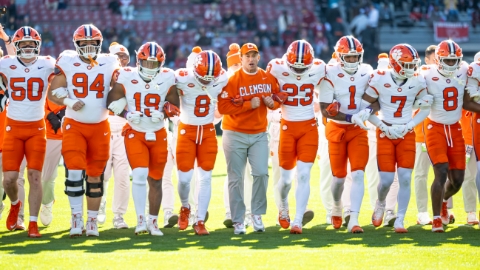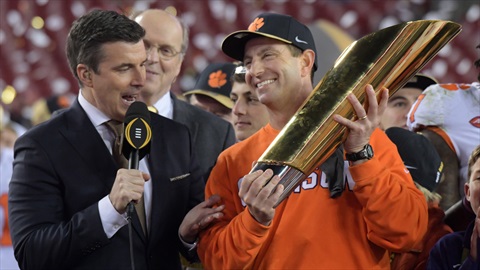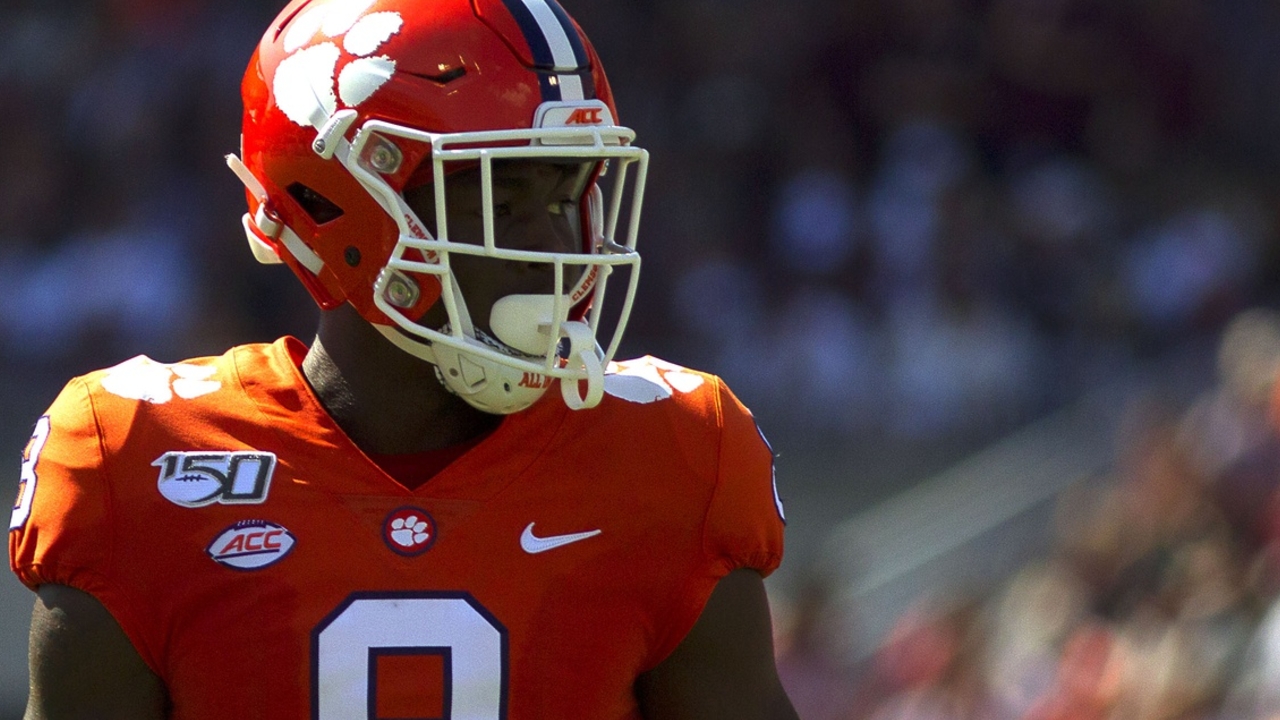
The following is a transcript from the College Football Playoff Committee Chairman Rob Mullens after the rankings were released this week.
ROB MULLENS: Good evening. The college football Selection Committee has completed our third week of rankings. They are as follows: LSU is ranked the No. 1 team in the nation; Ohio State is No. 2; Clemson is No. 3; and Georgia is No. 4.
Here's what the committee was thinking: LSU remains impressive with its powerful offense. They have three wins against teams in the top 25. Ohio State is strong on both sides of the ball. They've made a statement all year long. Clemson, too, has been dominant all season. Georgia beat a tough Auburn team on the road, and they also have wins against both Florida and Notre Dame. They're ranked No. 4.
The committee spent a lot of time talking about Alabama and Oregon. Members talked about how dominant Alabama has been all season. They also said Oregon is explosive and they were impressed by Oregon's quarterback, but Oregon's only loss came to No. 15 Auburn at a neutral site, while Alabama's only loss was to No. 1 LSU. Alabama is ranked No. 5 and Oregon No. 6.
Thank you to all the members who work so hard and take this so seriously. It's an honor to do this on behalf of everyone who loves college football. I'll be happy to take your questions.
What were the discussions about Oklahoma in terms of how high they should jump after beating an unbeaten team? And I'm not sure you can answer this, but how much were they compared to the two Pac-12 teams in Utah and Oregon?
ROB MULLENS: Well, we don't look at it on how far they're jumping. Remember, we start with a clean sheet of paper every week, and we do these in rounds. So I don't recall exactly when Oklahoma was on the board, but they would have been compared to a number of the one-loss teams for sure, and when we look at Oklahoma, we see obviously the second half and the win against No. 14 Baylor, only loss to K-State, and the committee felt that Oklahoma deserved to be No. 9.
BILL HANCOCK: About the Pac-12 teams, the committee discussion about Oregon was their consistent play all season, won nine in a row. Also Utah's strengths, strong on both sides of the ball, outstanding defense. So the committee ranked those teams where they did.
You were asked a question last week about the importance of final score versus what happens in a game. I'm just curious, Ohio State was up I think 42-0 on Maryland at halftime and pulled its starters. They were up 42-7 early in the 3rd and pulled the starters against Rutgers. When the committee is evaluating those games, does the evaluation kind of end there? Is that sort of a punctuation mark? How do you look at those?
ROB MULLENS: We watch the entire games. We certainly do not incent margin of victory, but we understand those were all convincing wins for Ohio State.
I think they're winning by an average of 40 something to 6 or something over the first three quarters of games this year. How much is a statistic like that factoring in to where the committee sees Ohio State right now?
ROB MULLENS: We don't evaluate that statistic, but again, we watch the games and we're very aware of the flow of the game and the score.
When you're discussing Baylor, you mentioned their weak non-conference schedule. I've noticed this with the basketball committee, as well. You also say that you don't really look at conferences, but I've seen the basketball committee reference non-conference schedule. How do you balance the fact that you are looking at their non-conference schedule but there's never a reference to their conference schedule or their conference record?
ROB MULLENS: Well, I mean, in short, we're looking at all the games. You know, the difference is the non-conference schedule they control and the conference schedule they don't control.
That would appear to be a sign that you're actually penalizing Baylor – I'm not saying you shouldn't, but you're penalizing them for attempting a weak non-conference schedule no matter how it plays out.
ROB MULLENS: No, the committee doesn't approach it like that. We just look at all the games, and when you look at Baylor's three non-conference opponents, they have a combined seven wins.
What did the committee have to say about the injury to Tua?
ROB MULLENS: Well, obviously we spent considerable time talking about it. Glad he's on his way to recovering. But Alabama had a convincing win at the end of the day. Understanding that he went out at the end of the second quarter, but it still was a convincing win, so it didn't impact the rankings this week.
How much if at all did committee members look back at the Arkansas game to look at what Alabama looks like with Mac Jones in the lineup?
ROB MULLENS: Well, the committee would have watched that in the week that it occurred, so they were aware of it, and we're aware that the backup quarterback had played for Alabama in previous games.
In terms of game control, I don't know if that's an actual metric or not, but just the way you watch the games, curious how the committee looks at Oklahoma. They fall behind by 25 at Kansas State, then they get to within an onside kick at the end. Three games in a row now. They go up 21 in the fourth quarter against Iowa State and that thing comes down to a two-point conversion at the end. And then Saturday night we know how the Baylor game went. When the committee sees Alabama win by 31, Oregon win by 28 and Utah win by 46, those are all against teams with losing records. How does the committee see Oklahoma having to fight it out while those other teams – against teams that are ranked when you compare with those other teams?
ROB MULLENS: To the first part of your question, that is not a metric and not something that the committee uses. Second, that's why we watch the games, and that's why the staff gives us the resources and the tools to be able to watch all of these games, so that when you come in fully prepared, we know who they're playing, we know the records of who they're playing, and we get to watch the games and see how they play out.
Is it safe to assume then that based on all the metrics that we're looking at and the way we watch the games that beating a ranked team gives you impresses the committee more than beating a team with a losing record? Is it safe to assume that's the way it operates, right?
ROB MULLENS: Yes, obviously the committee is aware when you beat a ranked team, for sure.
Kind of following up on the question regarding Tua, this is a relatively unique situation. I get Cardale Jones is the only comparable situation like this before. Has there been any talk in the committee room or was there any talk about how Alabama will be evaluated moving forward knowing that Tua Tagovailoa is not going to be there?
ROB MULLENS: No, we do not project, we do not look forward. Our charge is to rank the teams based on their body of work through week 12, and that's what we did. Obviously we'll watch the games moving forward and evaluate them after that.
But my next question would then be when you evaluate Alabama as a whole, how do you sort of balance Alabama pre-Tua – both pre-injury with what they've done, and how do you reconcile that with what potentially they would do the final two games? How do you balance those two sort of different teams, if you will, out?
ROB MULLENS: Just like we would any team that has key injuries. We are aware of who's available in what games, and we make an evaluation based on watching the games and the results.
Two of Florida's wins were against FCS opponents. How much has that factored into the conversations and how you view the Gators?
ROB MULLENS: It's certainly a part of the conversation. We're aware of the two FCS games, but we're also aware that they beat No. 15 Auburn and their two losses are to the No. 1 and No. 4 ranked teams.
I wondered if you could provide some insight in terms of the gap between the three unbeaten teams at the top and maybe just 1 through 3 and between 4, 5 and 6 and beyond, is there a big gap in your mind between those groups?
ROB MULLENS: Well, we're very thorough in our conversations 1 through 25 and even beyond, and so the committee does spend considerable time on 1 through 3. Obviously those are the three undefeated teams, and after last week, with LSU's win, Ohio State's win and Clemson's win, the committee felt that was the order. LSU 1, Ohio State 2 and Clemson 3 through week 12.
It seems every week that there are certain markers within the rankings of where there are big gaps between teams even though they're only separated by a spot or two. Would you say there's a big gap between 3 and the teams ranked below 3?
ROB MULLENS: No, I don't think there's a way to evaluate that. Again, we debate all of these teams, and I don't know that there's a measurement that could reference the gap. There's a lot of debate, a lot of conversations amongst those pools, so I don't have a – I don't think there's a way to measure that.
No unranked team has ever participated in a New Year's Six bowl before, but if you look at the Orange Bowl, which gets an automatic ACC bid this year, Clemson goes to the playoff, the Orange Bowl will have to fill that with an ACC team. Have you had discussions about the possibility of placing an unranked team in a New Year's Six bowl, and if so, have any discussions arose about possibly changing the system when a potential top-12 team could be left home in favor of an unranked team?
BILL HANCOCK: I'll take that one. The matter of the Orange Bowl pairing is up to the Orange Bowl, and it's not a part of CFP. Orange Bowl is a contract bowl with both sides filled by one side ACC and the other side Big Ten, SEC or Notre Dame. That will not be in the committee's purview. The Orange Bowl will just tell everyone who they have chosen.
Did the committee reward Oklahoma even more so by the fact that they did not have CeeDee Lamb at Baylor Saturday and still came back and won that game?
ROB MULLENS: CeeDee is a great player and a key part of their team. We were aware that he was not in the game and that they beat a ranked team on the road for sure.
A follow-up if I might. A quick comparison with regard to Oklahoma's resume and Utah and Oregon from the Pac. I'm going to assume that Oklahoma's win at Baylor is the best of those three one-loss teams to this date. How does that balance with Oklahoma's loss coming against Kansas State compared to say Oregon's loss to a higher ranked Auburn team? Does one balance the other out, or does one weigh more heavily on the committee's mind than the other?
ROB MULLENS: Well, probably depends by committee member, but remember, again, we're looking at full resumes, so we're looking at every win, every loss, and how those games played out and unfolded.
When you mentioned LSU you said, "remains impressive with a powerful offense," so there was a lot of concern locally, even among their fans, about the defense. How much parsing do you do in terms of, well, this team played is a more complete team or that team looked good in these two areas but not in the third? How much does that factor in, or do you just end up looking at the whole game and how impressive the win might have been given who they were playing?
ROB MULLENS: In the committee room we do talk about the different phases of the game for sure. But again, we're watching the games, looking at exactly how it happens. But we are talking about phases.
I just have a similar question to the last one. Do you guys look at teams and say and evaluate and credit them when they are complete and they do seem balanced offensively and defensively compared to teams that are stronger on one side of the ball?
ROB MULLENS: Well, results are the most important thing. Let's start with that. But sure, when you dig beyond the results, we're looking at the how, and so we are looking at offense, defense and special teams.
What is the committee's view of Penn State right now, and how do you feel like they stack up against the four one-loss teams that are above them?
ROB MULLENS: Well, the committee is impressed with Penn State. They've beat a No. 13 Michigan, won a tough road game at Iowa. Their only loss is to the team ranked No. 10, and as I mentioned on the show, a non-conference win over a 7-3 Pittsburgh team. Those are all quality wins.
What is that gap like in the committee's eyes right now between 4 and 8?
ROB MULLENS: Again, there's no measurement for that. What I can tell you is 4 through 8, there's plenty of discussion and a lot of debate about each of those teams. Their strengths, their weaknesses and where they should be ranked, and this week you can see how the committee voted in their rankings.
Regardless of Tua's injury at quarterback for Alabama, is there still – how close is that between Oregon's resume and Alabama's resume, and is Utah a factor at all in that discussion between those two?
ROB MULLENS: Well, sure. I mean, teams 5 through 7 – obviously when you look at Alabama, outstanding play. Their only loss is to the No. 1 team in the country, and in every other game they've had convincing wins. Oregon is a team that's won nine in a row, good road wins against ranked Southern Cal, at Washington, quality quarterback play, undefeated in the conference, only loss on a neutral field to Auburn. And then Utah, really strong defense, only loss is to No. 23 USC, and that's what separated them from Oregon, and when they lost to USC, Zack Moss, their elite running back, missed most of that game.
Following up on that, I wanted to ask you more about USC and what the committee liked about them this week.
ROB MULLENS: Well, they beat No. 7 Utah, which is impressive, and when you look at the opponents that they've lost to, those opponents have a record of 29-11. So they've challenged themselves in the non-conference with Notre Dame and BYU, so that impressed the committee.
Beyond the USC common opponent, what are some of the other differences the committee sees between Utah and Oregon?
BILL HANCOCK: I'll take that one. I think the committee felt like they're both excellent football teams. I think the USC thing was probably got the most discussion when they analyzed those two. Oregon obviously defeated USC handily, and Utah lost. And Oregon's resume, including the loss to a good Auburn team in the last seconds of the game, and Utah really doesn't have anything like that. So that was the difference.
You were talking about what is and isn't metrics. Georgia, I think five of their last six teams were coming off a bye. Is that taking into consideration and could you elaborate more on where Georgia is involved in the debate with the other teams in the top eight?
ROB MULLENS: Well, again, all I can say is that we see the schedules. I don't know that we're specific looking at when byes fall, but when we're comparing opponents we see the sequence of the games by date for sure. And again, Georgia is in that conversation. They're in the pool in the first two rounds, which is 1 through 6, so they're a part of that debate.
